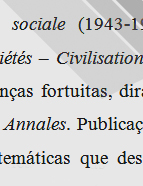

................................
Despite the convergence of approaches, there was no doctrinal unity. Approaches, problematics, methods: all those who partook of this spirit always denied that the Annales had become a school.
As explained by one of its members, "the historians of the School, stricto sensu, worked in overly diverse directions to be easily regrouped under a common intellectual maxim", always due to "the absence of a system spirit which characterized the Annales from its very inception", resulting in a kind of "vagrancy across all the fields", by "exceptional opportunity and freedom", in an attitude consisting "wholly of hospitality and openness." (Furet, A Oficina, p. 9). In the words of Magalhães Godinho: "There is no 'Paris school' in historiography, in the sense of a group of historians who follow a standard and adopt a form. There is only, and to a very great extent, a common approach towards [...]departing from problems, and the fundamental problems of human existence. It involves pursuing paths of explanation through the patient task of collecting data and elaborating as fully as possible, without fearing the audacity of the hypotheses, never being confined within narrow horizons, but always embracing each and every other perspective. For the "Annales" group, there is no such thing as compartmentalized human sciences [...]" (Godinho, Ensaios III, pp. 273-274) . Indeed, Fernand Braudel, in 1955, was emphatic: "there is an Annales movement, not a school" (Braudel, Les ambitions, p. 172). The following year, upon assuming the direction of the journal due to the unexpected death of Lucien Febvre, he further reiterated: "Neither Marc Bloch nor Lucien Febvre had the intention or the illusion of founding a School, with its formulas and solutions." (Braudel, "Les Annales", pp. 1-2). And some even argue that it is "a scientific community" and reject the idea that it is "a dogmatic shrine." (Revel and Chartrier, “Annales”, p. 29).
Such openness to the human sciences and freedom stood in stark contrast to what was being experienced in Portugal at the time, where methodical or neo-methodical historiography (Nunes, A História p. 260), frequently of excellent erudite quality, was but that alone (and often not even that), bore no interest in any methodological innovation or in the construction of new problematics.
